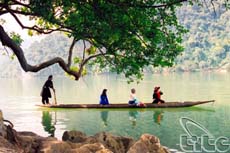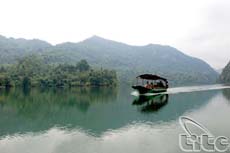Ba Be, a pearl amidst the evergreen Tay Bac forest, is considered a must-visit destination with its splendid landscape and mystical legends. The beautiful lake in the northern province of Bac Kan is listed as one of the world’s 20 largest freshwater lakes in need of preservation.
 After departing from the capital city, the passenger car took me to Bac Kan Town on Road 3. Viewing the passing hamlets in the car, I was sunk in divergent legends of Ba Be Lake. One legend says that this area used to be a very large valley sheltering the Nam Mau Village. Each year, the villagers gathered to hold an offering ceremony for Buddha. One year, a leprous old woman came to the ceremony but was neglected and asked to keep away from the others. Luckily, a widow welcomed her and gave her food. The old woman, who later turned out to be a fairy mother, paid respect by granting the widow a handful of ash and a seed of rice. The next day a monsoon overwhelmed the valley but the hoof the widow was somehow raised above the water line and protected. Following the fairy mother’s words, the widow scattered the handful of ash around the hoand water could not flow into her house; she threw the cover of the rice seed into the water, and it turned into a dug-out canoe which helped her float. After that, the flooded valley turned into three lakes which today form Ba Be Lake. Ba Be, meaning three lakes, was created by the confluence of river tributaries Pe Lam, Pe Lu and Pe Leng (Pe means Lake in Tay language) after earthquakes tens of millions of years ago.
After departing from the capital city, the passenger car took me to Bac Kan Town on Road 3. Viewing the passing hamlets in the car, I was sunk in divergent legends of Ba Be Lake. One legend says that this area used to be a very large valley sheltering the Nam Mau Village. Each year, the villagers gathered to hold an offering ceremony for Buddha. One year, a leprous old woman came to the ceremony but was neglected and asked to keep away from the others. Luckily, a widow welcomed her and gave her food. The old woman, who later turned out to be a fairy mother, paid respect by granting the widow a handful of ash and a seed of rice. The next day a monsoon overwhelmed the valley but the hoof the widow was somehow raised above the water line and protected. Following the fairy mother’s words, the widow scattered the handful of ash around the hoand water could not flow into her house; she threw the cover of the rice seed into the water, and it turned into a dug-out canoe which helped her float. After that, the flooded valley turned into three lakes which today form Ba Be Lake. Ba Be, meaning three lakes, was created by the confluence of river tributaries Pe Lam, Pe Lu and Pe Leng (Pe means Lake in Tay language) after earthquakes tens of millions of years ago.
 Passing through the reed grasses, downstream from the serene Nang River, I saw many dug-out canoes like the kind mentioned in the legend. For local people living along the Nang River and Ba Be Lake, they are popular means of transportation. A dug-out canoe looks like the cover of rice seed. It's dedicated and long. It can glide fast and even downstream without energy-consumption, and it never leaks. Dug-out canoes are indispensable when people want to catch small fish in the lake.
Passing through the reed grasses, downstream from the serene Nang River, I saw many dug-out canoes like the kind mentioned in the legend. For local people living along the Nang River and Ba Be Lake, they are popular means of transportation. A dug-out canoe looks like the cover of rice seed. It's dedicated and long. It can glide fast and even downstream without energy-consumption, and it never leaks. Dug-out canoes are indispensable when people want to catch small fish in the lake.
The canoe drifts through the bends of the river and past scenic high cliffs through Lung Nham Mountain to reach Puong Cave. Inside the cave with the poor light there exist many stalactites in different shapes overhead. Ba Be Lake is surrounded by many ancient trees, from which several varieties of precious wood are obtained. Up to 30 animal species such as wild pigs, bears, panthers, monkeys, and birds inhabit the area. Scenic high limestone cliffs around the lake with the height of several thousands of meters look like skyscrapers amidst the city. Along the two riverbanks lie many hamlets of the Tay, Red Dao and White H’mong ethnic minorities.
 Riverside trees swayed in the wind to welcome me back to the crossroads between the Nang River and the way to Ba Be. I turned right into the tributary of light blue water and then headed for Ba Be Lake which is 4km from the cave. The 8km long and 3km wide lake covers an area of 650 hectares. According to scientific research, Ba Be Lake was formed approximately 200 million years ago due to geological constitution. The lake, located 145m above sea level, is surrounded by limestone cliffs. This biodiversity reservoir is the habitat for fauna and flora thousands of years old. The surface of the lake is so tranquil that people can see even see the lake bed. It is home to 106 fish species and is surrounded by many ancient trees.
Riverside trees swayed in the wind to welcome me back to the crossroads between the Nang River and the way to Ba Be. I turned right into the tributary of light blue water and then headed for Ba Be Lake which is 4km from the cave. The 8km long and 3km wide lake covers an area of 650 hectares. According to scientific research, Ba Be Lake was formed approximately 200 million years ago due to geological constitution. The lake, located 145m above sea level, is surrounded by limestone cliffs. This biodiversity reservoir is the habitat for fauna and flora thousands of years old. The surface of the lake is so tranquil that people can see even see the lake bed. It is home to 106 fish species and is surrounded by many ancient trees.
After having taken a tour around the lake, I went to visit a temple on An Ma Island to offer incense. On the way back, I stopped to enjoy wine and fried fishes made by local women at a tent at the Ba Be lakeside. With its original and unspoiled landscape, Ba Be still offers a haven of peace and tranquility away from the bustle of city life. In addition to the river and lake tour, visitors can trek to local villages where Tay and Mong peoples live and keep their traditions.
Further information:
 Ba Be Lake is nearly 300km from Hanoi and 50km from Bac Kan municipality. From Hanoi, you can drive motor or take passenger car to Bac Kan. Upon arriving in Bac Kan, drive further 35km to reach Ra market, turn left onto National Highway 279, then travel another 10km to arrive at Ba Be Lake.
Ba Be Lake is nearly 300km from Hanoi and 50km from Bac Kan municipality. From Hanoi, you can drive motor or take passenger car to Bac Kan. Upon arriving in Bac Kan, drive further 35km to reach Ra market, turn left onto National Highway 279, then travel another 10km to arrive at Ba Be Lake.
Tourists can stay at guest building of Ba Be National Park which is price at 200,000/2 persons per room; or stay at stilt hoof Tay ethnic minority in Pac Ngoi and Po Lu hamlet with the price of VND15,000-20,000/person.
Famous specialty here is fish hot-pot, fried fish, roast chicken and goat meat enjoying with local sticky rice. Tourists will have the opportunity to take part in many folk games performed by local artists. In addition, visitors will have an unforgettable stay in the mountains by the lakes, enjoying sightseeing boat trips, hikes, water sports, and discovering the traditional customs of different ethnic minorities in the region.